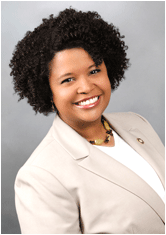JEFFERSON CITY, Mo. — Several black lawmakers from both sides of the state wasted no time in filing legislation directly responding to the unfolding events in Ferguson. Sen. Maria Chappelle-Nadal, the state senator from University City whose district includes Ferguson, filed perhaps the broadest of all these measures today.
The cornerstone of the legislation Chappelle-Nadal prefiled today – the first day lawmakers may file bills for 2015 — would require all active police officer to don body cameras, but that’s hardly where the bill ends.
Chappelle-Nadal has been one of the state’s most vocal lawmakers in the wake of unrest in Ferguson. She’s appeared on cable news networks, developed a massive online following, and has rarely missed an opportunity to chide law enforcement, as well as Gov. Jay Nixon.

“Audio and video from cameras do not lie,” Chappelle-Nadal said. “Too often the police tell one story, while the people tell another. Cameras with both audio and video will assist in settling controversial disputes.”
The other provisions of Chappelle-Nadal’s bill are a virtual laundry list of many of the demands made by Ferguson protestors themselves, including:
– scaling back of Missouri’s broad provisions on the use of deadly for by police officers,
– requiring a special prosecutor be appointed in any case in which an officer kills an unarmed suspect,
– requiring all law enforcement deployed to protests to wear clearly identifiable name tags,
– requiring the Governor to work with a neutral third party — Chappelle-Nadal specifically suggests Amnesty International — to “immediately report any abuses of human, civil, and constitutional rights to the Missouri and Unites States attorney generals,”
– prohibiting the use of tear gas unless a state of emergency is declared and a neutral third party is present to oversee its humane use, and
– requiring the Governor to dispatch state social workers, counselors and psychologists to the affected regions if he declares a state of emergency due to civil unrest.
Chappelle-Nadal is likely to face an uphill battle with her legislation, as the emotionally charged issue of Ferguson assumes its place as the single most controversial topic breached by current lawmakers in Missouri. Missouri citizens can expect more than one bill mandating body cameras for officers. Rep. Brandon Ellington, a Kansas City Democrat and the new chair of the Missouri Legislative Black Caucus, has filed a similar bill, along with Reps. Sharon Pace and Rochelle Walton Walton-Gray, also MLBC members – and they are hardly expected to be the only ones.
But whether the fix is cost-effective enough to make it to Nixon’s desk remains unclear. While body cameras remain relatively cheap, the storage of data remains a costly endeavor, and local prosecutors and defenders say reviewing video footage is more time and money for their offices.
Rep. Jeff Roorda — who is rapidly approaching his term limit in the House, is a former police officer, and business manager for the St. Louis Police Officers Association — said lawmakers were failing to engage law enforcement officials before filing their bills, making negotiations difficult.
Roorda also said that what happened to Michael Brown — the unarmed 18-year-old killed in Ferguson by Officer Darren Wilson — was a political failure, and not a failure of law enforcement.
“We know now that what happened to Michael Brown was not a failure of law enforcement,” Roorda said. “Wilson, according to a jury of his peers, acted properly. What led to Michael Brown being in the street that day, engaging in the behavior he was engaging in, was a political failure.”
Roorda said the best way to prevent “more Mike Brown’s” was by addressing underlying socio-economic causes in crime and poverty-ridden communities.
The regular legislative session beings on January 7.
Collin Reischman was the Managing Editor for The Missouri Times, and a graduate of Webster University with a Bachelor of Arts in Journalism.




